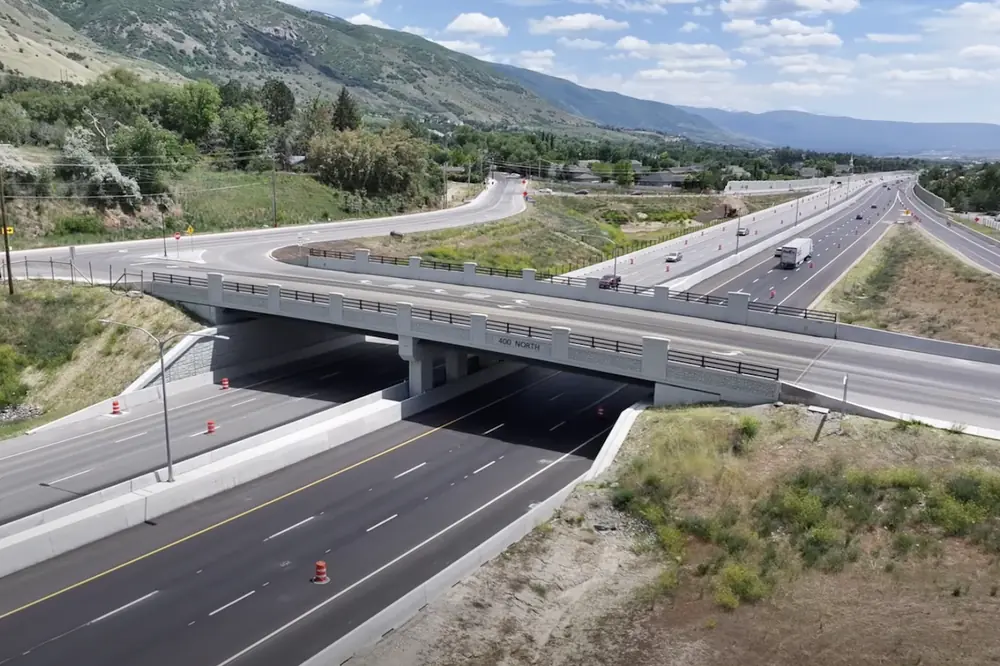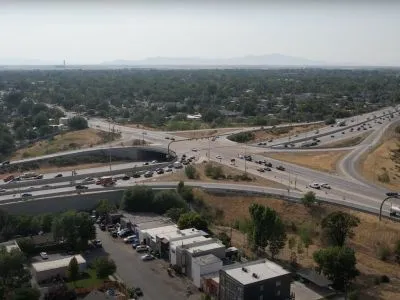
Granite Announces $111 Million Project Award from Utah DOT in Salt Lake City
Granite a leader in civil infrastructure and construction services, has announced it has been awarded a $111 million contract from the Utah Department of Transportation (UDOT) to execute a large-scale highway rehabilitation and improvement project in Salt Lake City. This significant undertaking, which will be jointly funded by UDOT and federal transportation programs, is set to enhance critical regional transportation corridors, improve safety, and extend the life of essential infrastructure assets.
The project, officially titled Interstate 215 (I-215): SR-201 to North Temple, will cover approximately three miles of the I-215 corridor—between mileposts 19.53 and 22.8—and will include comprehensive rehabilitation efforts across 12 miles of freeway ramps, including those for State Route 201 (SR-201), Interstate 80 (I-80), and California Avenue. Furthermore, a total of 22 bridges will undergo critical upgrades and repairs. Granite anticipates this contract will be recognized in its second quarter committed and awarded projects (CAP) backlog.
A Multi-Faceted Infrastructure Renewal Effort
“This project is multifaceted, encompassing a diverse array of components that span strategic planning, creative development, stakeholder engagement, and operational execution,” said Jason Klaumann, Granite’s Vice President of Regional Operations. “It will keep Granite’s paving and structure crews busy through the winter and into the fall of 2026, further strengthening the company’s relationship with UDOT and positioning Granite as a key player in future large bid-build projects.”
The scope of work represents a complex blend of highway surface reconstruction, structural enhancements, and drainage improvements. Granite will mobilize a substantial workforce and leverage its in-house materials production capabilities to deliver the project on schedule and to the highest performance standards.
Key Components of the Project

The rehabilitation and reconstruction scope includes the following major elements:
- Rubblization and Overlay: Granite will rubblize the existing Portland Cement Concrete Pavement (PCCP), a method that breaks old concrete into a base layer while minimizing demolition waste. This surface will then be overlaid with 175,000 tons of highly modified hot mix asphalt (HMHMA) to ensure long-term durability and optimal performance under heavy traffic volumes.
- Bridge Rehabilitation: A total of 22 bridges will be upgraded as part of the project. Of these, 18 will undergo complete deck replacements, including 10 via hydro-demolition—a technique that uses high-pressure water jets to selectively remove damaged concrete while preserving embedded steel reinforcement. The remaining eight bridge decks will be addressed using standard remove-and-replace methods. In addition to these full deck replacements, localized pothole patching and surface restoration will be applied across all bridges where necessary.
- Stormwater Drainage Improvements: The project calls for the installation of 22,000 linear feet of storm drain infrastructure. This will improve water conveyance and reduce flooding risks, especially during Utah’s seasonal weather shifts.
- Ramp Metering Enhancements: A new ramp metering system will be installed at California Avenue, aimed at reducing traffic congestion and improving traffic flow during peak hours. Ramp meters regulate the flow of vehicles entering highways, thereby smoothing the merge process and increasing overall freeway throughput.
Materials and Resources: Powered by Granite’s Local Network
Granite will rely on its Walker Hot Plant, located in close proximity to the jobsite, to supply the 175,000 tons of HMHMA as well as an additional 5,000 tons of temporary hot mix asphalt (HMA) required during construction staging and temporary traffic shifts.
Using a local production facility helps reduce emissions associated with long-distance material hauling and enhances operational efficiency, a key consideration for large-scale infrastructure projects with tight schedules and environmental standards. Granite’s vertically integrated supply chain and operational assets offer significant advantages when executing projects of this complexity.
Project Timeline and Community Impact
Construction activities are currently scheduled to begin in August 2025, with a planned completion date in November 2026. Granite has committed to working closely with UDOT, municipal agencies, and local communities to minimize disruptions and ensure that traffic flow, noise mitigation, and safety are actively managed throughout the project’s duration.
Because this section of I-215 is a critical commuter and freight corridor in the Salt Lake City metro area, UDOT has emphasized the importance of delivering the improvements with minimal impact to travelers. Granite’s extensive experience in managing complex, multi-phase highway projects in active traffic environments positions the firm well for this challenge.
Strengthening Long-Term Infrastructure Resilience
This project represents a key investment in the long-term functionality and resilience of Utah’s transportation infrastructure. By combining modern materials, advanced rehabilitation techniques, and smart traffic engineering, UDOT and Granite aim to deliver a next-generation corridor that supports economic development, improves safety, and prepares the region’s infrastructure for future demands.
Granite’s leadership underscored the strategic importance of the project in its broader growth trajectory. “This contract award is a strong testament to the capabilities of our Utah operations team and the trust we’ve earned from the Utah DOT over many years of successful project delivery,” said Klaumann. “We’re proud to take on this essential work and contribute to the continued vitality of the region’s infrastructure.




